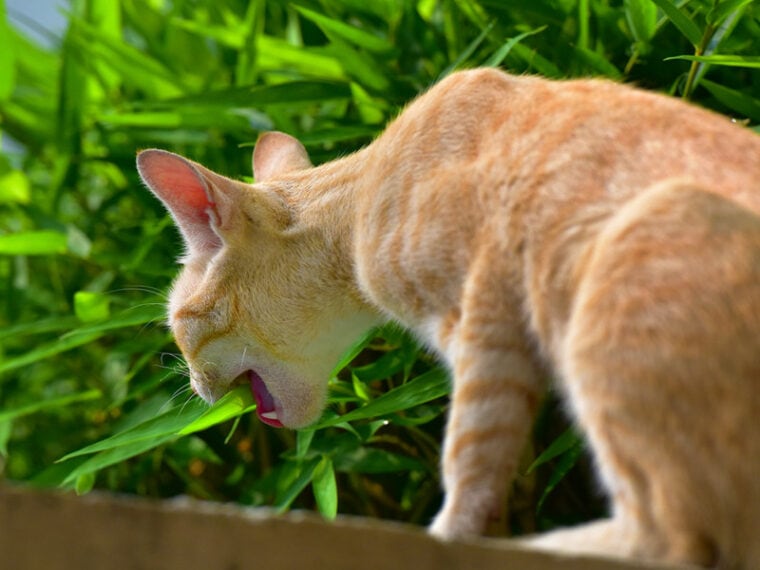
When you hear the tell-tale sound of your cat gagging, you most likely grab the cleaning supplies because you know what’s about to follow. Of course, most owners are more than used to their cat’s occasional hairball or vomit, but what if it’s neither of these? If you walk in to find your cat has brought up what looks like a smushed sausage of food, you might wonder what it is. Regurgitation resembles a snake-like tube of compact food that hasn’t been digested.
There are distinct differences between regurgitation and vomiting; the primary difference is that regurgitation is a passive action. Your cat will easily eject the food from its esophagus without sharp contractions. In contrast, vomiting is often forceful and active, meaning the stomach contracts to get rid of the vomit. Vomit is also made of digested or partially digested food and other stomach contents and it might look more like liquid.
What Causes Regurgitation?
There are a few causes of regurgitation in cats, some of which are harmless and others more concerning. It’s important to remember that regurgitation differs from vomiting and that something is causing the esophagus to eject food immediately rather than from the stomach. All of the following conditions are causes of regurgitation in cats, going from most to least common:
1. Eating Too Fast
If your cat is overzealous and gobbles down their food, their body can reject it. If your cat has always been a fast eater, a slow feeder or a puzzle feeder will be very helpful. If you notice a sudden change in the speed at which your cat eats, you should start watching them closely, keep a record, and speak to your vet if the behavior persists. Certain illnesses can increase your cat’s appetite and change their eating habits. Additionally, check that your cat has enough food and space to eat as they want and that they are not competing for resources with another kitty.
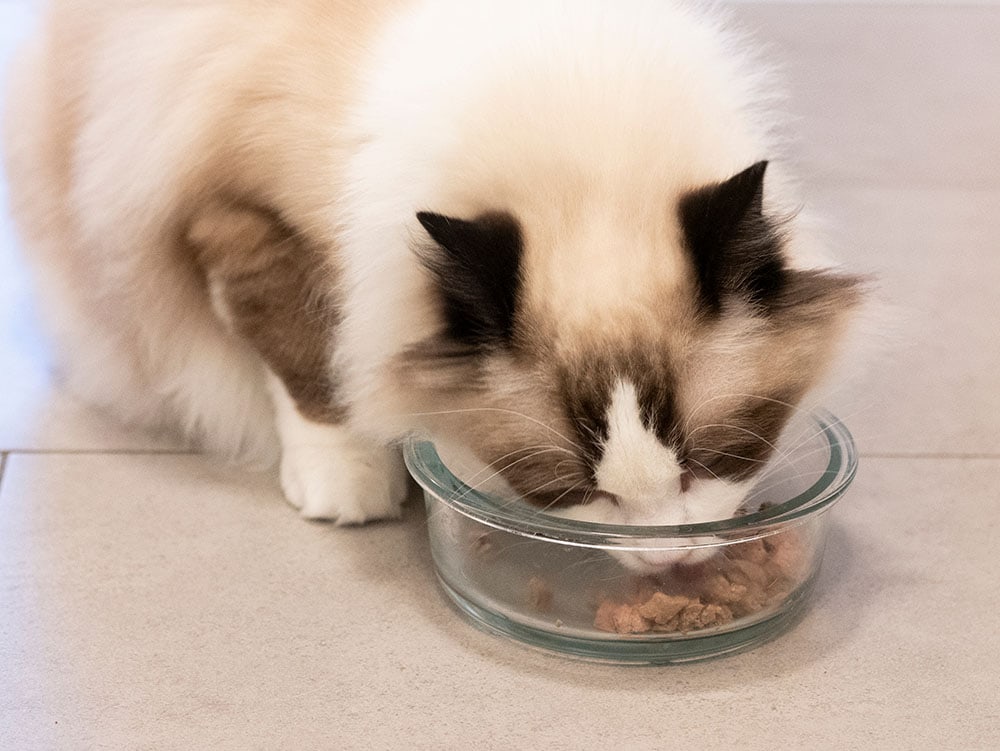
2. Eating Too Much
If your cat eats more than their stomach can handle, it will become full, and the esophagus will eject the food waiting to enter the stomach. This food comes back up as a tube of soft but still-formed, undigested food.
3. Drinking Too Much Water
Like overeating, if your cat gulps water right before eating, their stomach can become full and overburdened. This can cause regurgitation, but luckily this is not a common concern in cats.
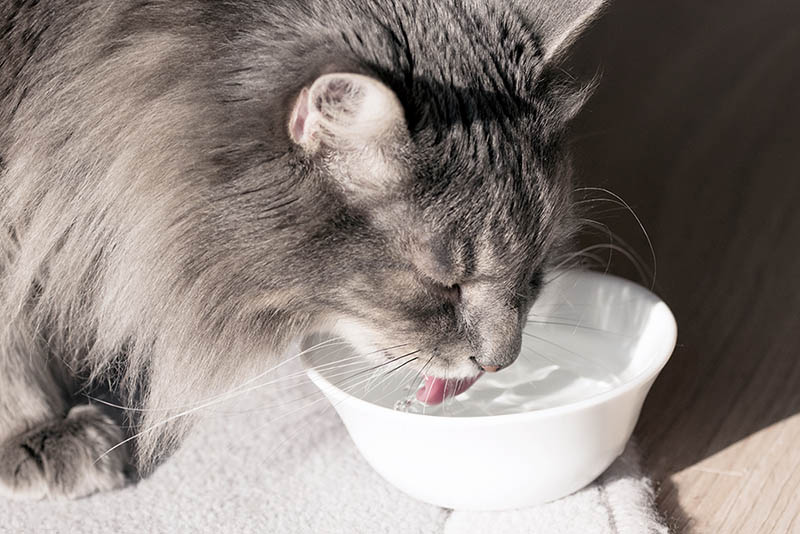
4. Esophagitis
Some diseases of the esophagus can cause regurgitation1. Esophagitis, or an inflammation of the esophagus, is one reason for regurgitation in cats, which can be caused by several factors, including:
5. Esophageal Strictures
Esophageal strictures is a narrowing of the lining of the esophagus that occurs for different reasons. A foreign body, acid reflux, or an irritating substance can cause trauma to the inside of the esophagus, scarring it and narrowing the circumference of the tube. Inflammation or tumors can also trigger this problem. If your vet suspects that your cat suffers from esophageal stricture, they will likely recommend some form of imaging (X-rays, endoscopy, or fluoroscopy) and will discuss the treatment options depending on the degree of your cat’s signs.
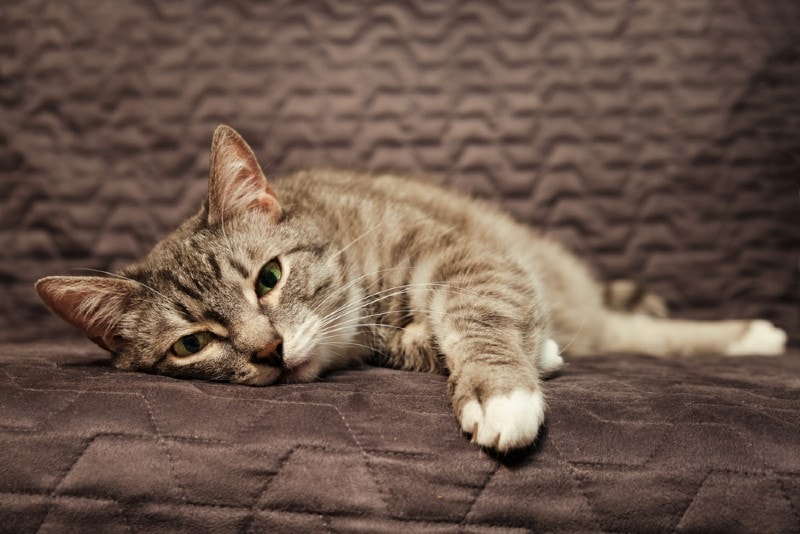
6. Decreased Motility
Decreased esophageal motility (megaesophagus or hypomotility) is a condition in which the diameter of the esophagus is enlarged and the muscles of the wall can’t function properly, making it harder for food to move down into the stomach effectively. This condition can be congenital or acquired and is more common in Siamese cats (although it’s still rare).
 How Can I Tell if My Cat Regurgitated or Vomited?
How Can I Tell if My Cat Regurgitated or Vomited?
There are differences in regurgitating and vomiting that you can observe in your cat. When regurgitating, the food will be undigested, which often happens immediately after eating (although it can be a few hours post-ingestion). Your cat will seem largely unbothered by this, as regurgitation produces no nausea and doesn’t make its stomach contract. The food will likely be mushy and sometimes accompanied by a small amount of liquid. Vomiting, on the other hand, is often distressing for cats. When cats vomit, they often heave and retch as their abdomen and stomach contract to expel the contents, making them gag. Vomitus usually contains digested or partially digested stomach contents and liquid gastric juices. Cats may vomit more than once and often have other signs of illness such as reduced appetite or softer stools.
Signs your cat may be about to vomit include:
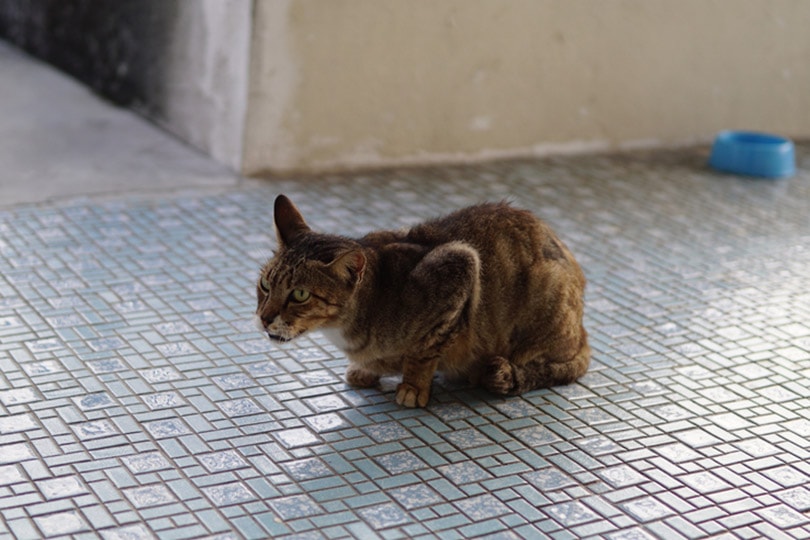
What Should I Do if My Cat Is Regurgitating?
If your cat has only regurgitated once and shows no other signs of illness, it’s likely nothing to worry about. The most common reasons for a cat regurgitating are eating too much or too quickly, but you need to contact your vet if you are concerned or unsure whether your cat is regurgitating or vomiting. However, if your cat is showing other signs of illness or regurgitating after every meal, you should contact your veterinarian. If your cat is choking or showing signs of having something stuck in their throat, such as drooling, pawing at their mouth, distress, and regurgitation, take them to the vet immediately.
Should I Feed My Cat Again After Regurgitation?
If your cat has just regurgitated their food, they may begin to eat it. Eating their regurgitated food will likely not cause harm, but cleaning it up before they can get to it can help prevent them from bringing it back up again. It’s advisable to withhold food for a little while after your cat regurgitates to prevent them from regurgitating more and allowing the esophagus to rest.
You shouldn’t withhold food for a long time, however, as cats need to eat little and often; a few hours maximum is all that is required. Always make sure they have plenty of fresh water. If you are concerned about when to feed your cat after they’ve regurgitated, you should check with your vet. Likewise, if your cat is regurgitating due to a medical condition, always follow your vet’s feeding instructions.
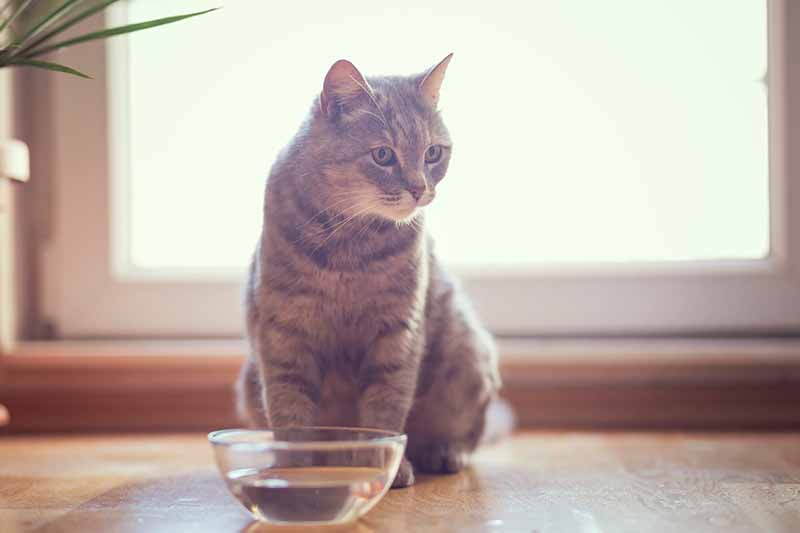
How Is Regurgitation Treated?
Regurgitation in cats is treated depending on what’s causing it. If your cat is bringing up food because they are eating too fast or too much, a slow feeder may help slow them down.
If your cat has a medical condition that causes regurgitation, your vet will offer recommendations based on the treatment for that condition. For example, a raised bowl can be all that is needed to treat minor cases of megaesophagus, but a foreign body will require surgery.
Final Thoughts
Cats that regurgitate often do so because they’ve gobbled their food too fast or tried to eat too much; regurgitation is different from vomiting because it’s a passive action. The food that’s ejected is often completely undigested and is sausage-shaped (the shape of the esophagus), and the cat will be largely unbothered by the experience. Vomiting is a much more distressing event to witness, with the stomach contracting to eject digested food and stomach acid forcefully. Sick cats will often be nervous, gag, and salivate before they vomit. There are many different reasons cats regurgitate, so speaking to your vet whenever you notice it is essential to rule out any health conditions.
Featured Image Credit: AjayTvm, Shutterstock






